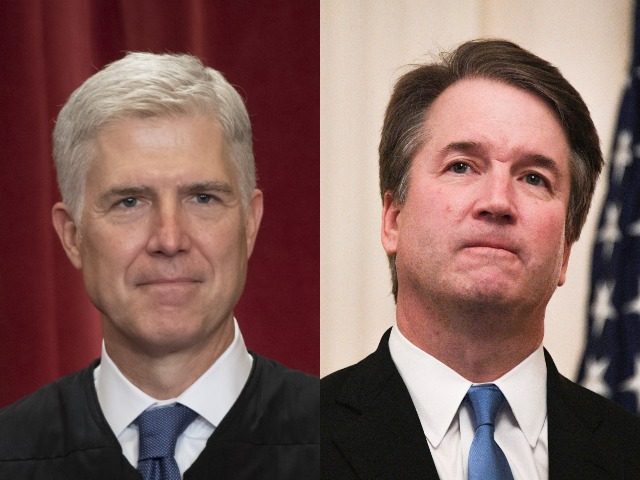WASHINGTON, DC – Justices Brett Kavanaugh and Neil Gorsuch’s questions during oral argument in an immigration case during Kavanaugh’s first week suggested a shift in how the Supreme Court will tackle that contentious issue, focusing more on following what Congress wrote than challenging lawmakers’ policy judgment.
For 25 years, ever since the solidly liberal Ruth Bader Ginsburg took the seat of moderate-conservative Byron White in 1993, advocates focused on the one or two remaining moderate justices as their swing votes. From 1993 to 2006, those two moderate justices were Sandra Day O’Connor and Anthony Kennedy. From 2006 to 2018, Kennedy was the sole remaining moderate.
As a consequence, many cases’ arguments focused exclusively on winning over Kennedy. Oral arguments repeatedly used words like “equality,” “fairness,” “dignity,” “evolving,” and often discussed how courts could balance competing factors to address a problem rather than discussing how Congress decided to address that same problem. Legal briefs were written in the same style.
There was a marked shift during arguments last Wednesday at the Court, after Kavanaugh was sworn in and Chief Justice John Roberts – now the most moderate of the Republican-appointed justices – became the most likely swing vote on the Court.
Although there was no “breakout” moment for the Court’s newest members, both of President Trump’s nominees fully engaged in a way that offers hints as to where the Court is going.
The case last week that was the most revealing involved a federal immigration law, which generally gives the U.S. Department of Homeland Security discretion on whether to detain a noncitizen while court proceedings are ongoing as to whether that person will be deported, or release that person on bond. However, 8 U.S.C. § 1226(c) specifies that certain criminal and terrorist foreigners must be kept in custody during the court case.
The American Civil Liberties Union (ACLU) filed a class-action suit in California for all foreigners subject to that exception, arguing that it applies only if federal agents take custody of the foreigner on the same day that he is released from state prison or a county jail. If not, that alien must be given a bond hearing and potentially set free.
A federal district court in California agreed with the ACLU. The U.S. Court of Appeals for the Ninth Circuit affirmed, holding that agents must arrest the alien with a “reasonable degree of immediacy” after release.
The question before the Supreme Court is:
Whether a criminal alien becomes exempt from mandatory detention under 8 U.S.C. 1226(c), if, after the alien is released from criminal custody, the Department of Homeland Security does not take him into immigration custody immediately.
“A criminal alien does not become exempt from mandatory detention by the happenstance that DHS did not arrest them immediately or promptly after they got out of jail or prison,” began Zachary Tripp from the Justice Department’s Office of the Solicitor General.
“So you think a person 50 years later, who is on his death bed, after stealing some bus transfers,” could still be subject to this law, “Justice Stephen Breyer asked later in the argument, suggesting that he believes that is some time limit, which is at the center of the debate.
President Trump’s two Supreme Court appointees took separate tacks during oral argument.
Kavanaugh extracted a concession from the ACLU lawyer that Congress knew that in many instances federal immigration authorities would not be able to take custody of a criminal alien immediately upon release from state custody, “whether it’s a reasonable time, or a year, or two years, or six months, or 48 hours.”
“When you combine those two points … Congress did not put in a time limit,” the Court’s newest member continued. “That raises a real question for me whether we should be superimposing a time limit into the statute when Congress … did no itself do so.”
The ACLU continued to argue that Section 1226(c) applies only if the arrest happens on the day as release, or perhaps 48 hours from release.
“That’s very odd when you think about what Congress was doing in 1996,” Kavanaugh responded, “because they were well aware that would not happen, (A), because of [limited] resources, [and] (B), because they’re not learning about [each inmate’s release] right away.”
Gorsuch likewise expressed serious skepticism regarding the ACLU’s argument, but left open the door that special cases involving relatively sympathetic individuals might come out differently.
When Justice Ruth Bader Ginsburg expressed doubt as to whether the law would permit the attorney general to detain someone for seven or eight years without a bond hearing, Gorsuch did not express concern over that sort of timeframe, but asked about someone who might have been released perhaps 30 years earlier.
“Thirty years, and the government was aware of him the entire time and chose not to act,” Gorsuch hypothesized, asking, “Kind of a laches problem. Is there any limit on the government’s power?”
The doctrine of laches is a concept of fairness from America’s common-law founding, under which a person with a legal claim might eventually forfeit it if it goes an extraordinarily long time without being asserted. The idea is that people with legal claims should raise them in a timely manner, and after a long time – perhaps many years – it is no longer fair to leave a legal threat hanging over someone’s head.
While establishment media outlets are crowing that Gorsuch may rule against the Trump administration for a second time on a legal argument, it is worth noting that Gorsuch raised the question but did not say he would go there. Devil’s-advocate questions are very common in Supreme Court arguments.
A decision is expected sometime next year, and could prove revealing regarding both of President Trump’s Supreme Court appointments.
The case is Nielsen v. Preap. No. 16-1363 in the Supreme Court of the United States.
Ken Klukowski is senior legal editor for Breitbart News. Follow him on Twitter @kenklukowski.

COMMENTS
Please let us know if you're having issues with commenting.